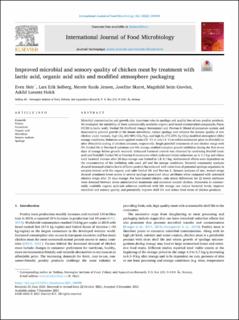| dc.contributor.author | Heir, Even | |
| dc.contributor.author | Solberg, Lars Erik | |
| dc.contributor.author | Jensen, Merete Rusås | |
| dc.contributor.author | Skaret, Josefine | |
| dc.contributor.author | Grøvlen, Magnhild Seim | |
| dc.contributor.author | Holck, Askild Lorentz | |
| dc.date.accessioned | 2021-12-14T09:29:03Z | |
| dc.date.available | 2021-12-14T09:29:03Z | |
| dc.date.created | 2021-12-10T10:35:31Z | |
| dc.date.issued | 2021 | |
| dc.identifier.issn | 0168-1605 | |
| dc.identifier.uri | https://hdl.handle.net/11250/2834124 | |
| dc.description.abstract | Microbial contamination and growth play important roles in spoilage and quality loss of raw poultry products. We evaluated the suitability of three commercially available organic acid based antimicrobial compounds, Purac FCC80 (l-lactic acid), Verdad N6 (buffered vinegar fermentate) and Provian K (blend of potassium acetate and diacetate) to prevent growth of the innate microbiota, reduce spoilage and enhance the sensory quality of raw chicken under vacuum, high CO2 (60/40% CO2/N2), and high O2 (75/25% O2/CO2) modified atmosphere (MA) storage conditions. Solutions were applied warm (50 °C) or cold (4 °C) to reflect treatments prior to (Prechill) or after (Postchill) cooling of chicken carcasses, respectively. Single postchill treatments of raw chicken wings with 5% Verdad N6 or Provian K solutions and MA storage enabled complete growth inhibition during the first seven days of storage before growth resumed. Enhanced bacterial control was obtained by combining Prechill lactic acid and Postchill Verdad N6 or Provian K treatments which indicated initial reductions up to 1.1 log and where total bacterial increase after 20 days storage was limited to 1.8–2.1 log. Antibacterial effects were dependent on the concentration of the inhibiting salts used, pH and the storage conditions. Bacterial community analyses showed increased relative levels of Gram-positive bacteria and with reductions of potential spoilage organisms in samples treated with the organic acid salts Verdad N6 and Provian K. Sensory analyses of raw, treated wings showed prominent lower scores in several spoilage associated odour attributes when compared with untreated chicken wings after 13 days storage. For heat-treated chicken, only minor differences for 22 tested attributes were detected between seven antimicrobial treatments and untreated control chicken. Immersion in commercially available organic acid/salt solutions combined with MA storage can reduce bacterial levels, improve microbial and sensory quality, and potentially improve shelf life and reduce food waste of chicken products. | |
| dc.language.iso | eng | |
| dc.subject | Fermentate | |
| dc.subject | Fermentate | |
| dc.subject | Poultry | |
| dc.subject | Poultry | |
| dc.subject | Microbiota | |
| dc.subject | Microbiota | |
| dc.subject | Sensory analysis | |
| dc.subject | Sensory analysis | |
| dc.subject | Organic acid | |
| dc.subject | Organic acid | |
| dc.title | Improved microbial and sensory quality of chicken meat by treatment with lactic acid, organic acid salts and modified atmosphere packaging | |
| dc.type | Peer reviewed | |
| dc.type | Journal article | |
| dc.description.version | publishedVersion | |
| dc.source.volume | 362 | |
| dc.source.journal | International journal of food microbiology | |
| dc.identifier.doi | 10.1016/j.ijfoodmicro.2021.109498 | |
| dc.identifier.cristin | 1966966 | |
| dc.relation.project | Norges forskningsråd: 262306 | |
| dc.relation.project | Norges forskningsråd: 314743 | |
| dc.relation.project | Nofima AS: 201704 | |
| dc.relation.project | Nofima AS: 202104 | |
| cristin.ispublished | true | |
| cristin.fulltext | original | |
| cristin.qualitycode | 2 | |
